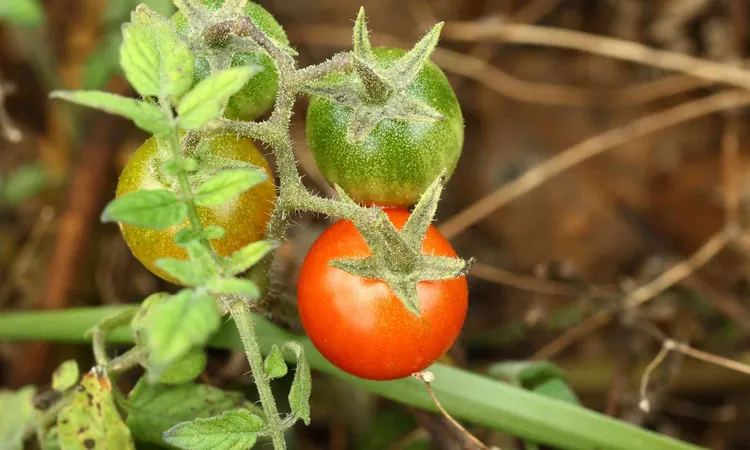
Groundbreaking Discovery: Wild Tomatoes Exhibit 'Reverse Evolution'!
2025-07-16
Author: Yu
Scientists Make Stunning Find in the Galápagos Islands
In a remarkable twist of nature, wild tomatoes from the volcanic soils of the Fernandina and Isabela Islands have done what biologists once deemed nearly impossible: they have revived a long-lost molecular defense mechanism. This phenomenon, now highlighted as a clear example of reverse evolution, showcases the re-emergence of an ancestral trait that had vanished from tomato relatives millions of years ago.
A Scientific Breakthrough Unveiled
Lead researcher Adam Jozwiak from the University of California, Riverside, alongside a team from the Weizmann Institute, meticulously mapped this stunning comeback. These resilient wild tomatoes now produce a cocktail of bitter chemicals that fend off insects and animals eager to nibble on them.
Returning to Ancient Defenses
On the younger islands, these tomatoes have shifted their defense chemistry to utilize a toxin reminiscent of those found in eggplants, an ancient trait not seen in modern tomatoes. Remarkably, this ancient toxin proves more effective in coping with the harsh conditions of lava soil and extreme heat.
Just Four Amino Acids Changed Everything!
What’s behind this jaw-dropping change? It boils down to a single enzyme that determines how these natural defense chemicals are produced. A mere four amino acids were modified, effectively reigniting a long-dormant chemical pathway and restoring the older, more potent version of the toxin.
Surviving in an Extreme Environment
The Galápagos Islands present a harsh environment for plants, characterized by rocky volcanic terrain and minimal soil. These tomatoes have adapted to this grueling climate by resurrecting a chemical defense strategy from their evolutionary past, demonstrating that sometimes nature looks back for solutions instead of forging new paths.
Evolution Isn’t Always a Straight Line!
This discovery challenges the notion that lost traits are permanently gone. Research reveals that certain species can indeed reverse their evolutionary course, evidenced by other organisms like salamanders and certain insects that have regained previously lost characteristics. The tomatoes’ ability to retrieve ancestral traits raises intriguing possibilities about the flexibility of evolution.
A New Era for Crop Science?
The implications of this discovery ripple through agricultural science. By tweaking merely four amino acids in a related enzyme within tobacco plants, researchers demonstrated they could stimulate the production of this ancestral toxin, suggesting a promising avenue for bolstering pest resistance in modern agriculture.
Nature’s Hidden Instructions
This adaptability points to an astonishing fact: even in a plant's genetic history, there are likely pathways and instructions that remain dormant, waiting for the right conditions to reemerge. The study's findings provide critical insights into the flexible nature of evolution, potentially allowing crops to tap into their genetic past to survive in changing climates.
Wider Implications for the Plant Kingdom
Tomatoes belong to the Solanaceae family, which includes well-known plants like peppers and potatoes. With this study suggesting that they too may harbor hidden biochemical pathways, scientists are excited about the potential for discovering new therapeutic and agricultural uses.
Redefining Evolutionary Science
As researchers delve deeper into the evolutionary dynamics of such traits, we are left to ponder how often traits believed to be lost are simply waiting for an opportunity to come back. This captivating study is gaining attention, and its findings have been published in the prestigious journal Nature Communications.



 Brasil (PT)
Brasil (PT)
 Canada (EN)
Canada (EN)
 Chile (ES)
Chile (ES)
 Česko (CS)
Česko (CS)
 대한민국 (KO)
대한민국 (KO)
 España (ES)
España (ES)
 France (FR)
France (FR)
 Hong Kong (EN)
Hong Kong (EN)
 Italia (IT)
Italia (IT)
 日本 (JA)
日本 (JA)
 Magyarország (HU)
Magyarország (HU)
 Norge (NO)
Norge (NO)
 Polska (PL)
Polska (PL)
 Schweiz (DE)
Schweiz (DE)
 Singapore (EN)
Singapore (EN)
 Sverige (SV)
Sverige (SV)
 Suomi (FI)
Suomi (FI)
 Türkiye (TR)
Türkiye (TR)
 الإمارات العربية المتحدة (AR)
الإمارات العربية المتحدة (AR)